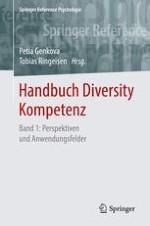2016 | OriginalPaper | Buchkapitel
Diversity Kompetenz: Führung von und in (interkulturellen) Teams
verfasst von : Daniela Gröschke
Erschienen in: Handbuch Diversity Kompetenz
Verlag: Springer Fachmedien Wiesbaden
Aktivieren Sie unsere intelligente Suche, um passende Fachinhalte oder Patente zu finden.
Wählen Sie Textabschnitte aus um mit Künstlicher Intelligenz passenden Patente zu finden. powered by
Markieren Sie Textabschnitte, um KI-gestützt weitere passende Inhalte zu finden. powered by
